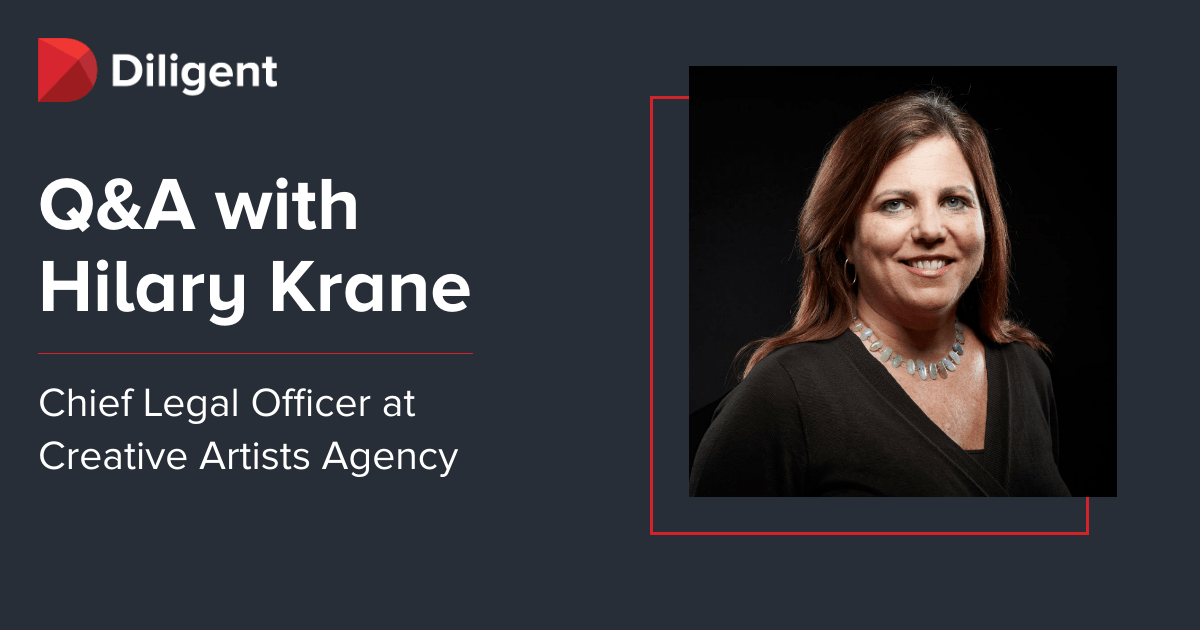In this Q&A, Merryck & Co.'s Adam Bryant and David Reimer interview Hilary Krane, Chief Legal Officer at Creative Arts Agency and former General Counsel, Nike. As the role of the general counsel evolves, Krane talks about her responsibility as a business partner and strategist — and the power of an early bedtime.
David Reimer is the CEO of Merryck & Co Americas. Adam Bryant is a Managing Director at Merryck & Co and long-time Columnist of The New York Times' "Corner Office."
___________________
Reimer: In your experience, how has the role of the GC evolved over time?
Krane: For a long time, the lawyer was somebody you didn't always want in the room. There was a fear that they would say no. You went to the lawyer if you had to. You got them to fix things. They weren't really considered a strategic partner because they weren't considered a businessperson. Lawyers were considered specialists.
Lawyers also have a reputation that they are supposed to identify every area of a new idea that could be a problem. A lot of people in the profession did not realize that you can do that silently. You don't have to share all those concerns, because business people don't like sitting in meetings listening to 15 minutes about all the things that could go wrong.
But over time, there was a switch to becoming more of a business partner. People realized that you could unlock a lot of potential value by incorporating lawyers into front-end strategic development and planning because it would make things move faster. They could recognize key roadblocks earlier. Lawyers are fast learners, have the capacity for business thinking, and can add to the conversation. That mindset shift led to a total change of the role of the general counsel on the senior management team.
When I was sitting with the senior management team of Nike, I would say that 90 percent of my contribution was observations on the dynamic of the business rather than on technical legal issues. I was in a unique position because the legal team sees everything that's happening across the whole business. Once you do that a few times and you show that value, people say, "Yes, please, more of that."
It's like we say in our business — that we need to build products that the consumer wants. No business works in a push market. It only works in a pull market. The legal profession at large, at least in-house, is now creating pull markets in corporations for the expertise and insight that lawyers can bring. That fundamentally changes everything.
Bryant: Does the dynamic you just described change how you hire? How do you foster that mentality across the function?
Krane: I hire for and look for subject-matter excellence, combined with an interest in business and a personality that is constructive, curious, and shows a willingness to develop others. Those are the people who rise to the top in my organization. And then everybody else starts realizing that being the best in the world at X, Y and Z doesn't get you a place at the table. You need to be the best at those things and care about your people. Once you have that system working, it's self-reinforcing. People who think of themselves as great technical lawyers but who don't have those other skills will stall out and either go someplace else or they'll develop those skills or they'll accept it and be a pro-in-place, which is wonderful. We need pros-in-place as technical specialists.Reimer: What is the GC's role in fostering a culture?
Krane: The general counsel's role is the same in some respects as every other senior leader — to be a role model. But it also stops at the general counsel's door to say what we're going to tolerate and not tolerate in business practices. And often those business-practice decisions show your people what you really stand for. People need to know that a company that says it's going to do the right thing is in fact going to do the right thing. They need proof points.Bryant: Can you talk about your learning curve in terms of the GC's role in working with the board?
Krane: The actual work that's part of the general counsel role is table stakes. The way you really add value is by giving them the confidence in you as a human being and in your mastery of your role so that they feel they can come to you to have conversations and to share ideas and concerns.The key lesson for me is that you need to give the board a sense of security that they can ask you any question that's on their mind, including ones they don't want to ask during board meetings. It's about developing that level of trust.
- Hilary Krane, Chief Legal Officer at Creative Arts Agency and former General Counsel, Nike





